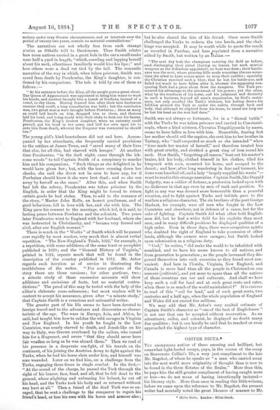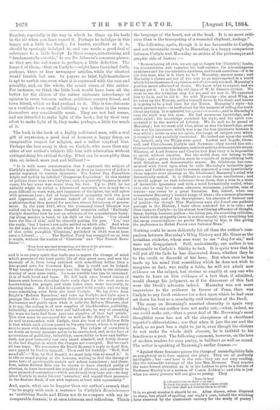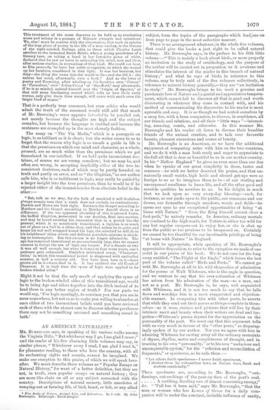0 BITER DICTA.* THE anonymous author of these amusing and
brilliant, but somewhat light-heeled essays, pays, in the course of the essay on Benvenuto Cellini's life, a very just compliment to the late Mr. Bagehot, of whom he speaks as "a man who carried away into the next world more originality of thought than is now to be found in the three Estates of the Realm." More than this, he pays him the still greater compliment of having caught more or less—we do not mean of having intentionally imitated— his literary style. More than once in reading this little volume, before we came upon the reference to Mr. Bagehot, the present writer had mentally noted the great likeness of manner to Mr.
• Ot,der Dicta. Loudon : Elliot Stock.
Bagehot, especially in the way in which he flings up his heels in the air when you least expect it. Perhaps he indulges in this happy art a little too freely; for banter, excellent as it is, should be sparingly indulged in, and one needs a good deal of substance to a little levity' In these essays, entertaining and "fundamentally sensible," to use Dr. Johnson's sonorous phrase, as they are, the substance is, perhaps, a little defective. The longest of them,—that on Carlyle,—might have furnished fiirth, perhaps, three or four newspaper articles, while the shortest would furnish but one. In papers so brief, lightheartedness is apt to surfeit one, even when it is expressed with the ease and geniality, and, on the whole, the sound sense, of this author. For instance, we think the little book would have been all the better for the elision of the rather elaborate interchange of opinion in verse between author, publisher, country friend, and town friend, which we find prefixed to it. This is too elaborate as a vestibule to so small a building ; nor is there in the verses themselves any considerable merit. They are not bad verses, and are intended to make light of the book ; but by their very effort to make light of it, they make, perhaps, a little too much of it.
The book is the book of a highly cultivated man, with a real gift of expression, a good deal of humour, a happy fancy, an imaginative respect for religion, and a rather sceptical bias. Perhaps the best essay is that on Carlyle, who more than any other of our author's subjects fills him with admiration without extinguishing his critical faculty. What can be more pithy than this, or, indeed, more just and brilliant ?—
" It is with some consternation that I approach the subject of Carlyle's politics. One handles them as does an inspector of police a parcel reported to contain dynamite. The Latter Day Pamphlets might not unfitly be labelled Dangerous Explosives.' In this matter of politics there were two Carlyles ; and, as generally happens in such cases, his last state was worse than his first. tip to 1843, he not unfairly might be called a Liberal—of uncertain vote it may be—a man difficult to work with, and impatient of discipline, but still aglow with generous heat ; full of large-hearted sympathy with the poor and oppressed, and of intense hatred of the cruel and shallow sophistries that then passed for maxims, almost for axioms, of govern- ment. In the year 1819, when the yeomanry round Glasgow was called out to keep down some dreadful monsters called Radicals,' Carlyle describes how he met an advocate of his acquaintance hurry- ing along, musket in hand, to his drill on the Links. You should have the like of this,' said he, cheerily patting his gun. ' Yes,' was the reply, but I haven't yet quite settled on which side.' And when he did make his choice, on the whole be chose rightly. The author of that noble pamphlet 'Chartism,' published in 1840, was at least
once a Liberal The Radical Party has straggled on as best it might, without the author of Chartism' and The French Revo- lution '—
' They have marched prospering, not thronzh his presence ; Songs have inspired them, not from his l)re and it is no party spirit that leads one to regret the change of mind which prevented the later public life of this great man, and now the memory of it. from being enriched with something better than a five-pound note for Governor Eyre. But it could not be helped. What brought about the rupture was his losing faith in the ultimate destiny of man upon earth. No more terrible loss can be sustained. It is of both heart and hope. He fell back upon heated visions of heaven-sent heroes, devoting their early days for the most part to hoodwinking the people, and their latter ones, more heroically, to shooting them. But it is foolish to quarrel with results, and we may learn something even from the later Carlyle. We lay down John Bright's 'Reform Speeches,' and take np Carlyle, and light upon a passage like this : Inexpressibly delirious tleetne to me the puddle of Parliament and public upon what it calls the Reform Measure, that is to say, the calling in of new supplies of blockheadism. gullibility, bribability, amenability to beer and balderdash, by way of amending the woes we have had from prev:ons supplies of that had article.' This view must be accounted for as well us Mr. Bright's. We shall do well to remember, with Carlyle, that the best of all Reform Bills is that which each citizen passes in his own breast, where it is pretty sure to meet with strenuous opposition. The reform of ourselves is no doubt an heroic measure never to be overlooked, and, in the face of accusations of gullibility, bribability, amenability to beer and balder- dash, our poor humanity can only stand abashed, and feebly demur to the bad English in which the charges are conveyed. Bat we can't all lose hope. We remember Sir David Ramsay's reply to Lord Rea, once quoted by Carl le himself. Then said his lordship: Well, God mend Nay, by God Donald, we must help him to mend it.' It as idle to stand gaping at the heavens, waiting to feel the throng of some hero of questionable morals and robust conscience; and there- fore, unless Reform Bills can be shown to have checked purity of election, to have increased the stupidity of electors, and generally to have promoted corruption—which notoriously they have not—we may allow Carlyle to make his exit swearing,' and regard their presence tin the Statute Book, if not with rapture, at least with equanimity."
And, again, what can be happier than our author's remark that ." to be angry with such a sentence in Carlyle's Reminiscences as 'scribbling Sands and Eliots not fit to compare with my in-
comparable Jeannie,' is at once inhuman and ridiculous. This is the language of the heart, not of the head. It is no more criti- cism than is the trumpeting of a wounded elephant, zoology."
The following, again, though it is too favourable to Carlyle, and not favourable enough to Macaulay, is a happy comparison between Carlyle and Macaulay as artists of the picturesque and graphic side of history ;—
" Remembering all this, we are apt to forget his [Carlyle's] faults, his eccentricities and vagaries, his buffooneries, his too-outrageous cynicisms and his too-intrusive egotisms, and to ask ourselves—if it be not this man, who is it then to be ? Macaulay, answer some ; and Macaulay's claims are not of the sort to go unrecognised in a world which loves clearness of expression and of view only too well. Macaulay's position never admitted of doubt. We know what to expect, and we always get it. It is like the old days of W. G. Grace's cricket. We went to see the leviathan slog for six, and we saw it. We expected him to do it, and he did it. So with Macaulay—the good Whig, as he takes np the History, settles himself down in his chair, and knows it is going to be a bad time for the Tories. Macaulay's style—his much-praised style—is ineffectual for the purpose of telling the truth about anything. It is splendid, but spl end tde mendax, and in Macaulay's case the style was the man. He had enormous knowledge, and a noble spirit; his knowledge enriched his style, and his spirit con- secrated it to the service of Liberty. We do well to be proud of Macaulay ; but we must add that, great as was his knowledge, great also was his ignorance, which was none the less ignorance because it was wilful ; noble as was his spirit, the range of subject over which it energized was painfully restricted. He looked out upon the world, but, behold, only the Whigs were good. Luther and Loyola, Crom- well and Claverhouse, Carlyle and Newman—they moved him not; theirenthusiasms were delusions, and their politics demonstrable errors. Whereas, of Lord Somers and Charles first Earl Grey it is impossible to speak without emotion. But the world does not belong to the Whigs ; and a great historian must be capable of sympathizing both with delusions and demonstrable errors. Mr. Gladstone has com- mented with force upon what ho calla Macaulay's invincible igno- rance, and further says that to certain aspects of a case (particularly those aspects most pleasing to Mr. Gladstone) Macaulay's mind was hermetically sealed. It is difficult to resist these conclusions; and it would appear no rash inference from them, that a man in a state of invincible ignorance and with a mind hermetically sealed, what- ever else he may be—orator, advocate, statesman, journalist, man of letters—can never be a great historian. But, indeed, when one remembers Macaulay's limited range of ideas; the common-placeness of his morality, and of his descriptions ; his absence of humour and of pathos—for though Miss Martineau says she found one pathetic passage in the History, I have often searched for it in vain ; and then turns to Carlyle—to his almost bewildering affluence of thought, fancy, feeling, humour, pathos—his biting pen, his scorching criticism, his world-wide sympathy (save in certain moods) with everything but the smug commonplace—to prefer Macaulay to him, is like giving the preference to Birket Foster over Salvator Rosa."
Nothing could be more delicately hit off than the author's com-
parison between Macaulay's Whig History and Mr. Grace as the leviathan cricketer, whom men went to see " slog for six," and were not disappointed. Still, undoubtedly, our author is too favourable to Carlyle's fidelity to fact. It is quite true that he will put all the facts he has discovered down, whether they be to the credit or discredit of his hero. But when once he has made up his mind that something which he does not wish to recognise as fact, was really a fable, he will not admit new evidence on the subject, but storms as angrily at any one who wants to force on him evidence of a fact that, if admitted, would change his judgment, as if the discoverer of this fact were the Devil's advocate indeed. Macaulay was not more impervious to the evidence in favour of Penn, than was
Carlyle to any fresh evidence for a fact upon which he had once set down his foot as a mendacity and invention of the Devil.
The essay on Browning's asserted obscurity is again very dashing ; but our author does not make out,—what, indeed, no one could make out,—that a great deal of Mr. Browning's most thoughtful verse has not all the abruptness of a shorthand reporter's abbreviations ; nor that when it jars the ear and the mind, as no poet has a right to jar it, even though his elisions do not make the whole drift obscure, he is faithful to his function as a poet. The following comment, however, on the love of modern readers for easy poetry, is brilliant as well as sound.
The writer is speaking of Browning's earlier dramas :—
" Against these dramatic pieces the charge of unintelligibility fails as completely as it does agaiust the plays. They are all perfectly intelligible ; but—and here is the rub—they are not easy reading, like the estimable writings of the late Mrs. Hemans. They require the same honest attention as it is the fashion to give to a lecture of Professor Huxley's or a sermon of Canon Liddon's: and this is just what too many persons will not give to poetry. They
' Love to bear
A soft pulsation in their e icy ear ; To torn the page, and let their senses drink A lay that shall not trouble them to think.'
It is no great wonder it should be so. After dinner, when disposed to sleep, but afraid of spoiling our night's rest, behold the witching hour reserved by the nineteenth century for the study of poetry !
This treatment of the muse deserves to be held up to everlasting scorn and infamy in a passage of Miltonic strength and splendour.
We, alas! must be content with the observation, that such an opinion of the true place of poetry in the life of a man excites, in the breasts of the right-minded, feelings akin to those which Charles Lamb ascribes to the immortal Sarah Battle, when a young gentleman of a literary turn, on taking a hand in her favourite game of whist, declared that he saw no harm in unbending the mind, now and then, after serious studies, in recreations of that kind. She could not bear, so Elia proceeds, 'to have her noble occupation, to which she wound up her faculties, considered in that light. It was her business, her duty—the thing she came into the world to do—and she did it : she unbent her mind, afterwards, over a book !' And so the lover of poetry and Browning, after winding up his faculties over Comas' or Paracelsus,' over Julius Closer' or Strafford,' may afterwards, if he is so minded, unbend himself over the ' Origin of Species,' or that still more fascinating record which tells us how little curly worms, only give them time enough, will cover with earth even the larger kind of stones."
That is a perfectly true comment, but even critics who would admit the truth of the comment would still add that much
of Mr. Browning's verse appears intended to be puzzled out, not merely because the thoughts are high and the subject
complex, but because the language is crabbed and because the sentences are crumpled up in the most slovenly fashion.
The essay on "The Via Media," which is a panegyric on logic, is as brilliant as it is short ; but the writer seems to us to forget that the reason why logic is so unsafe a guide in life is that the premisses on which our mind and character, as a whole, proceed, are so much wider than the premisses which we get formulated in our intellect. If we hold quite inconsistent doc-
trines, of course we are wrong somehow ; but we may be, and often are, wrong, in accepting implicitly either of the two in- consistent doctrines, each of which may be partly founded on
truth and partly on error, and so " the illogician," as our author calls him, who is so indifferent to logic, may really be guided by a larger insight into the true premisses, than he would be if he rejected either of the inconsistencies from absolute belief in the other :—
"But, talk as we may, for the balk of mankind it will doubtless always remain true that a truth does not exclude its contradictory. Darwin and Moses are both right. Between the Gospel according to Matthew and the Gospel according to Matthew Arnold there is no difference. If the too apparent absurdity of this is pressed home, the baffled illogician, persecuted in one position, flees into another, and may be heard assuring his tormentor that in a period like the present, which is so notoriously transitional, a logician is as much out of place as a bull in a china shop, and that unless he is quiet, and keeps his tail well wrapped round his legs, the mischief he will do to his neighbours' china creeds and delicate porcelain opinions is shock- ing to contemplate. But this excuse is no longer admissible. The age has remained transitional so unconscionably long, that we cannot consent to forego the use of logic any longer. For a decade or two it was all well enough, but when it comes to four score years, one's patience gets exhausted. Carlyle's celebrated essay, Character- istics,' in which this transitional period is diagnosed with unrivalled acumen, is half a century old. Men have been born in it—have grown old in it—have died in it. It has outlived the old Court of Chancery. It is high time the spurs of logic were applied to its broken-winded sides."
Might it not be that the only result of applying the spurs of logic to the broken-winded sides of this transitional age, would be to bring Age and riders together into the ditch instead of to land them in any better region of truth ? For our parts we would say, ' Use logic sparingly, to convince you that you are in error somewhere, but not so as to make you willing to abandon at once either of two inconsistent beliefs until you have reviewed each of them with the utmost care to discover whether perchance there may not be something unsound and something sound in both.'




































 Previous page
Previous page